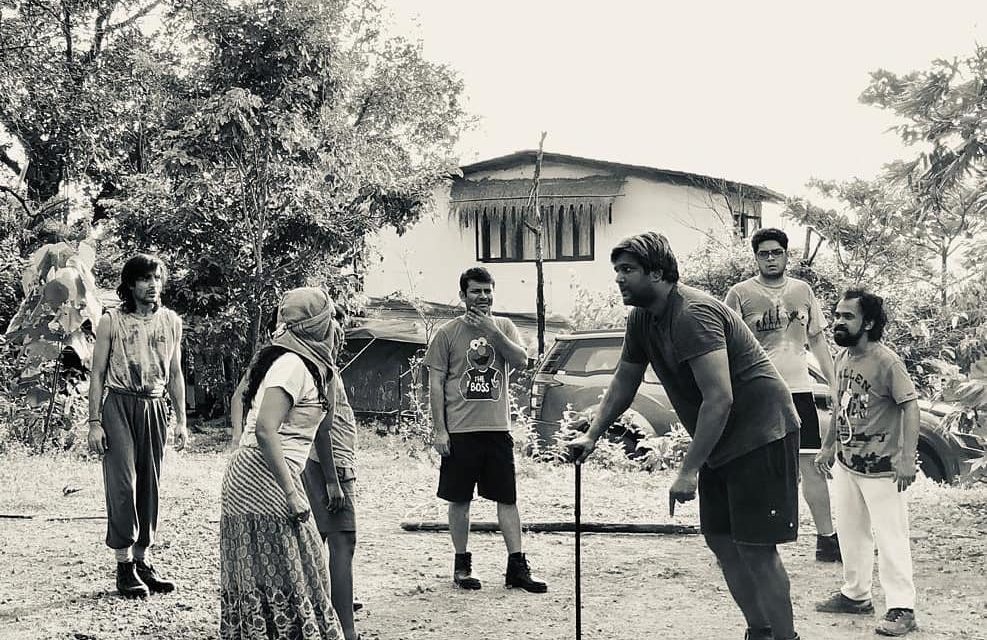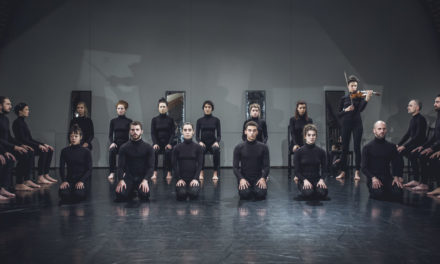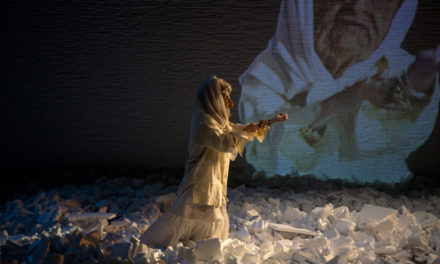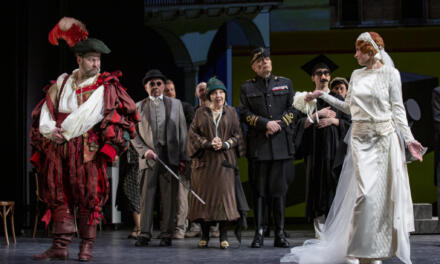The prolific theatremaker Faezeh Jalali has once again emerged from a strenuous and demanding schedule with a new production in tow — an ambitious staging of Vineet Bhalla’s dystopian fairy tale, A Farming Story, with as many as 19 actors jousting for space in a script packed with foreboding and dramatic tension. The actors play creatures of human and animal stock, or “hummals,” who eke out a subsistence in agrarian desolation, and the arrival of another strain of hybrids results in conflict and chaos. It is a play in which evolution has certainly taken an eccentric turn. But written during the Syrian refugee crisis, A Farming Story is ultimately a narrative about cliques and outsiders, with stark undercurrents of the xenophobic attitudes that are rife today.
Strong political undertone
Bhalla did not set his tale in a specific geography but states, “There is a common universal language across cultures when it comes to dehumanizing refugees so that we can comfortably ignore their plight.”
The script won the 2016 Sultan Padamsee Playwriting Award, for which Jalali’s Shikhandi was also a contender. They promised to read each other’s plays, with Jalali getting around to reading A Farming Story a few months later. Its strong political undertone was what drew Jalali to the script at the outset.
“Even though it’s sheer fantasy, it talks about real everyday issues like migration, refugees, or environmental degradation,” she says.
Bhalla’s influences have ranged from George Orwell’s Animal Farm to Arthur Miller’s The Crucible, which helped shape this original take on a world in crisis.
Jalali’s recent plays have been devised works with a marked physicality of presentation, in which spoken text served the form in many ways. Here, although Bhalla’s old English lyricism was neutralized for Indian audiences, it is still a prosaic text-heavy excursion in which the writing expounds the themes almost self-sufficiently.
“The material didn’t lend itself to movement, but we explored the animal characteristics of the ‘hummals’,” she explains.
Without overdoing the gestural component, the characters retained subtle feral essences, and inventive make-up and costumes completed the illusion. In a play like Shikhandi, marrying Indian traditional forms with a peppy urban script was the challenge. Here, working with multiple elements of stagecraft to create the textures of a futuristic ethos proved an exciting proposition. For instance, the costumes by designer Navneet Patil utilize a lot of recycled material, almost in keeping with the environmental consciousness shared by the play and its director.
Long-distance collaboration
Jalali is no stranger to large crews—her school plays have involved hundreds of children, and productions like Jaal and Shikhandi have had large teams—but A Farming Story is still a humongous venture. Ideally, she would’ve liked an opening run of several shows in a single venue. Even though negotiations with the NCPA for such a season fell through, she has been able to line up a string of eight shows in two locations.
“In the coming year, I want to run it in long patches. Co-ordinating 19 actors is no small task, and it will also give the play room to breathe,” she says.
The long-distance collaboration with the Ireland-based Bhalla has been particularly gratifying for both parties.
“There has been a great reciprocity of trust and respect,” says Bhalla.
As with most theatre initiatives, funding has been a problem—Jalali’s initial outlay was ₹25 lakhs, an unheard-of figure for an experimental project. However, she has assiduously run a crowd-sourced funding campaign as well as a social media call-out for vintage props, clothes, and other material, with both yielding healthy contributions that have gone a long way in making A Farming Story possible.
This article originally appeared in The Hindu on November 7, 2018, and has been reposted with permission.
This post was written by the author in their personal capacity.The opinions expressed in this article are the author’s own and do not reflect the view of The Theatre Times, their staff or collaborators.
This post was written by Vikram Phukan.
The views expressed here belong to the author and do not necessarily reflect our views and opinions.


















